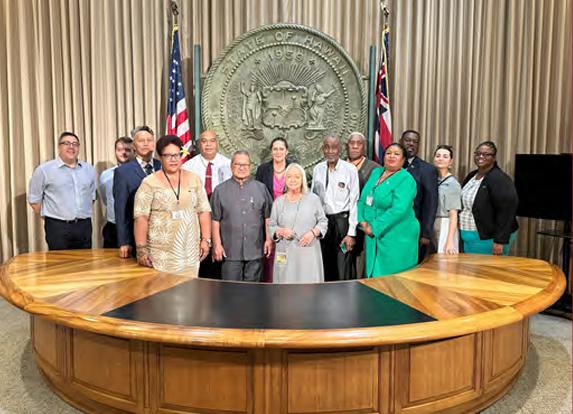CPA Small Branches and Disabilities


Both the CPA Small Branches and Commonwealth Parliamentarians with Disabilities (CPwD) networks can learn a lot from each other. In the pursuit of sustainable human development in small jurisdictions, sharing the collective experience of persons with disabilities both within and outside Parliament can be aided through the CPA and the great convening power of its networks.
Small jurisdictions face many unique challenges to their sustainable development, from more extreme impacts to climate change, reliance of international trade, vulnerability to external shocks, and resource constraints. Yet other issues are shared across all CPA Legislatures and that includes the continued under representation of persons with disabilities in Commonwealth Parliaments.
In addition to issues around representation, the rights of persons with disabilities have implications across many areas of public policy. The recent COP26 climate summit has shone a greater spotlight on the urgent and wide-ranging response needed to combat climate change. This is particularly the case for small jurisdictions who are on the frontline of the climate crisis, facing threats from sea level rise to more extreme weather events. Yet climate change and its impacts represent another area where the basic rights of persons with disabilities often gets overlooked. Take for example, disaster preparedness planning. Adequate shelters and protections often lack the appropriate facilities to comfortably accommodate all members of a community. This makes the experience of a hurricane or other natural disaster, already a destabilising one, even more so for persons with disabilities. I suspect this example reflects one of many, but less well known, barriers faced by persons with disabilities in small jurisdictions in exercising their rights.
According to the World Bank, one billion people, or 15% of the world’s population, experience some form of disability. Persons with disabilities, on average as a group, are more likely to experience adverse socioeconomic outcomes than persons without disabilities. The UN’s 2030 Agenda for Sustainable Development clearly states that disability cannot be a reason or criteria for lack of access to development programming and the realisation of human rights. The Sustainable Development Goals (SDGs) framework includes seven targets, which explicitly refer to persons with disabilities, and six further targets on persons in vulnerable situations, which include persons with disabilities. It is therefore important that the CPA and its networks include references to these targets within their strategic plans and forward planning.
The diversity of approaches to disability both across and within small jurisdictions also presents opportunities and challenges. For example, some jurisdictions may approach disabilities through a strictly medical lens, where different forms of physical or mental impairments differentiate between disabled and non-disabled persons. Others may emphasise a social model, focusing on the different social attitudes, norms and practices that may pose a challenge to the progress and acceptance of persons with disabilities in society. It is these differences that can often impact negatively on the progress of effective public policy or societal responses, for example by not revealing hidden inequalities that persons with disabilities often face or in not producing comprehensive data or statistics around disabilities to inform policy.
Therefore, it is essential to address the needs and concerns of persons with disabilities across areas of public policy. One way this can be most effectively achieved is through ensuring that persons with disabilities are represented across all branches of government. Especially within Parliament, where elected representatives are the conduit by which the rights, needs and challenges for all individuals - regardless of gender, age or disability - are channelled to government and the organs tasked with determining and deliberating policy and legislation. This makes the CPwD, in working to enable the full participation of persons with disabilities at all levels, including within Parliament and across wider society, so important.
One of my priorities when becoming Acting Chair of the CPA Small Branches was to oversee more collaboration between the CPA Small Branches and the other two CPA networks, the Commonwealth Women Parliamentarians (CWP) and the CPwD. The COVID-19 pandemic has caused disruptions to the practices of the CPA networks since 2020 but with the formation of the CPwD Regional Champions and the launch of the CPwD Strategic Plan more recently, the foundations have been laid to strengthen the bonds of mutual learning and knowledge exchange between all three networks.
This dedicated edition of The Parliamentarian with its particular focus on the challenges facing people with disabilities in the Commonwealth, similar to the CPA Small Branches special issue earlier in 2021, is testament to the growth of the CPwD as a newer but equal network within the CPA’s structure. The expertise, diversity of opinion, and perspectives included in the following pages should help Parliamentarians to further sensitise themselves to the issues, rights and challenges for persons with disabilities across the Commonwealth.


